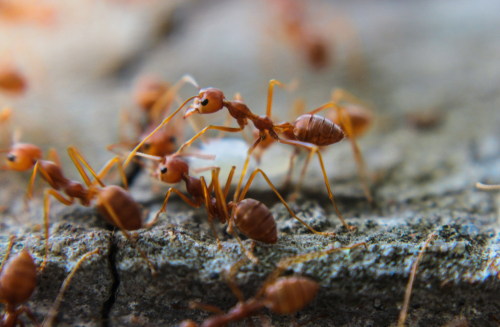Fire Ants In Texas
Read MorePosted on: Feb 14, 2024Luis M Pérez
Fire ants have become unwelcome in the state’s landscapes. These aggressive insects are scientifically known as Solenopsis invicta. They have firmly established themselves, causing both economic and ecological concerns.

Origin Of Fire Ants
Originally from South America, fire ants arrived in the United States in the early 20th century, most Likely through cargo shipments. Texas’s warm climate provides an ideal environment for these ants to thrive. They quickly spread across the state, creating extensive colonies. Fire Ants are characterized by their distinctive reddish-brown color.
One of the challenges posed by fire ants is their painful sting. Their venom contains toxins that can cause intense burning sensations and, most importantly, allergic reactions in some cases. This poses a threat to humans, pets, and livestock alike.
How To Treat Fire Ants
The best way to treat fire ants is with a bait treatment. Fire ants react quickly when disturbed. So, if you try to treat the mound, you will disturb it, and all the surviving ants will leave that mound and just set up a new one. Thus, mound treatments lead to the displacement or movement of ants. In contrast, a bait treatment is much more effective. At Dr. Green, we use a product called Top Choice, a bait that we spread around the home and lawn. The foraging ants are attracted to this bait, and they bring it home to their mound to feed the other ants in the colony. Thus, we can control the entire colony using bait.
In Conclusion,
Texas fire ants have become a formidable force and have become a danger to children, pets, and adults. Fire ants start to become very active as temperatures start to warm up in spring. However, it takes a good 30-45 days for baits to start being effective. Therefore, we suggest applying bait early in the year, like in February. Doctor Green uses a proven bait method, and we guarantee our fire ant baits for one full calendar year.
Questions
For more information on Fire Ants, Please email our Doctor Green Lawn Care Expert, Luis Perez, at luisp@doctorgreen.com.

